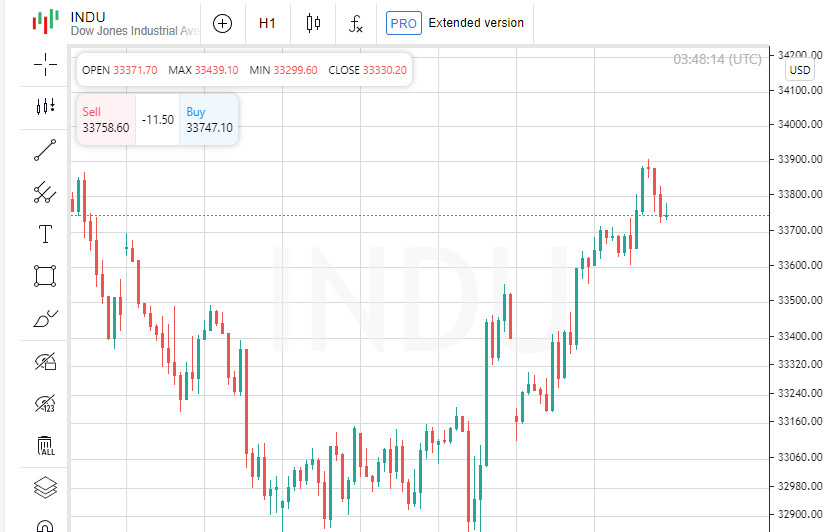
Wall Street indices continued their rise on Tuesday, despite geopolitical tensions in the Middle East. This was made possible thanks to steady comments from the Federal Reserve System of the USA, which curtailed the growth of Treasury bond yields.
Following public statements from the Fed, the President of the Federal Reserve Bank of Atlanta, Raphael Bostic, confirmed that the Federal Reserve does not plan to raise rates and sees no reason for concern about a possible recession.
The yield on 10-year Treasury bonds experienced a record decline on Tuesday, with trading suspended on Monday due to a holiday.
Meanwhile, the political situation in the Middle East remains tense. On Tuesday, airstrikes on the Gaza Strip led to extensive damage and human losses. This was in response to attacks that occurred over the weekend and were among the largest in the last 75 years.
John Pravin, Managing Director of Paleo Leon, comments: "The main focus points today are the situation in the Middle East and shifts in the bond market. The decline in bond yields is especially relevant."
The Fed's dovish stance on Tuesday boosted stocks, and investors' optimism regarding events in the Middle East only amplified this rise. However, Pravin warned that sentiments could change quickly if military conflicts spread to neighboring countries.
Peter Tuz of Chase Investment Counsel highlighted the same fact, explaining Tuesday's stock market rise with the decline in bond yields. He noted that the "global risk level has spiked." According to Tuz, "Considering recent events in Israel, I was genuinely surprised by the market's reaction. However, it seems that those seeking safety are shifting their investments to bonds, which in turn spurs stock growth."
In the end, the Dow Jones Industrial Index rose by 134.65 points, reaching 33,739.3, the S&P 500 index climbed by 22.58 points, to 4,358.24, and the Nasdaq Composite Index increased by 78.61 points, to 13,562.84.
Stocks in most sectors of the S&P 500 index showed growth. The most notable increase was seen in utilities, while the energy sector dipped slightly by 0.02%, although it had risen by 3.5% the previous day.
Later, Neel Kashkari, President of the Federal Reserve Bank of Minneapolis, expressed optimism about the U.S. economy, noting that the country is moving towards steady economic growth. He expects inflation to head towards the Fed's 2% target, with the unemployment rate not increasing.
However, Kashkari clarified: although the rise in Treasury bond yields might reduce the need for further rate hikes, if there's a significant shift in expectations regarding Fed policy, an adjustment might be needed to maintain that yield.
Christopher Waller from the Fed also emphasized the central bank's intentions to keep inflation within 2%.
According to the FedWatch CME tool, traders predict an 86% probability of keeping interest rates at the current level in November and 73% in December.
In the coming days, investors will be closely monitoring inflation data, including producer prices and consumer prices for September, and are also awaiting the release of the September FOMC meeting minutes. Friday will be of particular interest as the third-quarter corporate earnings season begins.
Among the companies that saw stock increases is PepsiCo, whose shares gained 1.9% after raising their annual profit outlook. This is the third forecast increase this year. Their main competitor, Coca-Cola, also saw its shares rise by 2.2%.
Major financial market players like Truist Financial demonstrated significant stock growth, signaling investor confidence in the bank. The speculated sale of the bank's insurance brokerage division to Stone Point could amount to approximately $10 billion, which could be a significant event in the financial world.
Additionally, electric vehicle maker Rivian Automotive's shares also rose. UBS's forecasts, which upgraded the stock from "neutral" to "buy", could be one of the reasons for this increase.
There was a general positive trend observed in the U.S. stock market. The ratio of rising to falling stocks on the New York Stock Exchange and on Nasdaq favored the advancing companies. It's also worth noting that the S&P 500 index hit record levels, and the Nasdaq Composite showed active movement, recording both new highs and lows.
The trading volume on US exchanges totaled 9.91 billion shares, slightly below the average for the last 20 sessions. This indicates that, despite market activity, investors continue to proceed with caution.
 English
English 
 Русский
Русский Bahasa Indonesia
Bahasa Indonesia Bahasa Malay
Bahasa Malay ไทย
ไทย Español
Español Deutsch
Deutsch Български
Български Français
Français Tiếng Việt
Tiếng Việt 中文
中文 বাংলা
বাংলা हिन्दी
हिन्दी Čeština
Čeština Українська
Українська Română
Română

